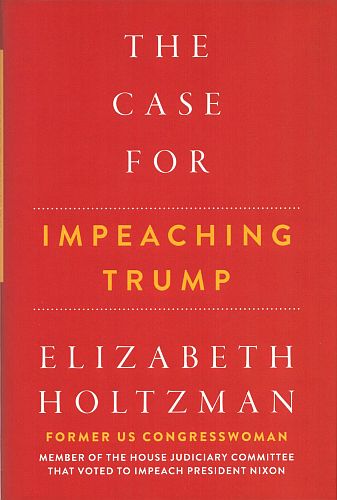

| THE CASE FOR IMPEACHING TRUMP Elizabeth Holtzman New York: Skyhorse Publishing, October 2018 |
Rating: 5.0 High |
|||
| ISBN-13 978-1-5107-4477-6 | ||||
| ISBN-10 1-5107-4477-0 | 162pp. | HC | $21.99 | |
Elizabeth Holtzman's advice about impeachment is informed by the fact that she lived through the process — as a junior member of the Judiciary Committee charged with beginning impeachment proceedings against Richard Nixon.
She marshals the facts and circumstances surrounding Trump's putative culpability for charges of impeachment in various categories, prioritizing the three most likely: failure to protect the integrity of our elections; obstruction of justice; and bribery or violation of the Constitution's emoluments clause. She discusses other possible justifications for impeachment, such as abuses of power connected with Trump's handling of immigrants from El Salvador, Guatemala, and Honduras — the so-called "Northern Triangle" of Central America.
In each case, she compares Trump's misconduct with the articles of impeachment brought against Nixon. She also lays out the deliberations of the Founding Fathers as they crafted the language governing impeachment they placed in the Constitution.
With an abundance of Trump tweets to choose from, she selected a few to support her assessments. Here is one showing how Trump clings to the idea that the Justice Department should be a hammer with which he is entitled to beat on anyone he chooses.
In late October and early November 2017, President Trump began publicly pushing for a new Justice Department investigation of Hillary Clinton. On October 30, the day Manafort was first indicted, President Trump tweeted: "Sorry but this is years ago, before Paul Manafort was part of the Trump campaign. But why aren't Crooked Hillary & the Dems the focus?????" That same week, in a November 2 interview with conservative talk-radio host Larry O'Connor, President Trump complained that as president he is not supposed to direct law enforcement to investigate Clinton. "The saddest thing is that because I am the president of the United States, I'm not supposed to be involved with the Justice Department. I'm not supposed to be involved with the FBI. I'm not supposed to be doing the kind of things I would love to be doing, and I am very frustrated by it. I look at what's happening with the Justice Department, why aren't they going after Hillary Clinton with her emails and with her dossier and the kind of money? I don't know." – Page 75 |
Elizabeth Holtzman was born in Brooklyn in 1941. She graduated magna cum laude and Phi Beta Kappa from Harvard's Radcliffe College in 1962 and from Harvard Law School in 1965. She served on the staff of New York City mayor John Lindsey from 1967 to 1970, and as a member of the New York State Democratic Committee from 1970 to 1972.
In 1972 she defeated House Judiciary Committee chairman Emanuel Celler in the Democratic Party primary. Celler had held his House seat for almost half a century. In taking it from him, Holtzman became at 31 the youngest woman ever to serve in Congress, a record she held for the next 42 years. She was placed on the Judiciary Committee herself, an assignment she decidedly did not relish. But she handled her many duties, along with a steep learning curve, going on to coauthor the first special prosecutor legislation and the 1980 Refugee Act.
She was later elected Brooklyn District Attorney, and then Comptroller of New York City. She continues to practice law at a private firm, and has written three other books and numerous articles.
Mrs. Holtzman has assembled an extensive collection of evidence. There is Trump's reluctance to impose sanctions on Russia, his consistent acceptance of Putin's word over that of his own intelligence agencies, and his keeping his meetings with Putin as off-the-record as possible. Some instances of his careless handling of classified information are mentioned (though, oddly, not the time he bragged about an Israeli operative to Russian officials1 in the Oval Office.) The matter of Wikileaks disclosures of emails and the story of the June 2016 meeting in Trump Tower with Natalia Veselnitskaya are covered in detail, and there is a wealth of financial data on the Trump International Hotel and other businesses in which Trump retains an interest.
It was in response to obstruction that the articles of impeachment against Nixon were adopted. Their message? Presidents cannot block, tamper with, and destroy the machinery of justice that is aimed at them. If they do, it is at their peril. They face impeachment, removal from office, even imprisonment. But if we allow presidents to block, tamper with, and destroy the machinery of justice that is aimed at them, we do so at our peril. The rule of law will go up in smoke. We will enshrine two standards of justice, one for the powerful and one for everyone else. We will find ourselves on the road to tyranny. It is a road we're dangerously close to traveling today. – Pages 125-6 |
It adds up to a strong circumstantial case against the 45th occupant of the Oval Office, one convincingly buttressed by Holtzman's Watergate experience and the scholarship included here. Appendices cover a history of impeachment in the U.S., the articles of impeachment against Richard Nixon, and the text of the first three articles of our Constitution. A list of selected sources is provided. There is no index, unfortunately. But I consider this well-organized and thoroughly researched book a must-read and a keeper.

 To contact Chris Winter, send email to this address.
To contact Chris Winter, send email to this address.